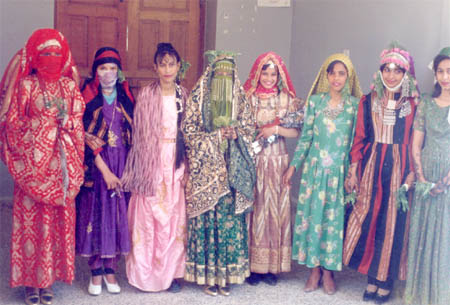
Getting married in Al-Aroq style [Archives:2002/15/Culture]
April 8 2002

Amal Bhalid al-Ariqi
In Yemen, because of its Islamic tradition, marriage is considered to be one of the most important actions in life. Its how humanity is continued on Earth.
There many customs and habits in Yemeni weddings, which vary depending on the village. Some parties are large. Others are small.
There are also different ways marriages are arranged.
The first way has the grooms mother chooses a girl for him.
The second way has the man chooses a girl and ask his mother to engage him with that girl. During the visit to the girls house, the grooms mother then expresses the desire saying We would like to have your daughter to be a wife for my son.
The girls mother asks for a week or more to think about it. It is considered shameful if the girls family says yes immediately.
A third way has the brides family agree on a meeting with the grooms father and relatives with the brides father and relatives. They meet to discuss and agree on a sum of money to be paid to brides father.
This practice differs from place to place. Some times money is paid early and sometimes its postponed to the night of the engagement.
Some money is paid before the wedding, some money is paid later. This money is called moakher.
In case something goes wrong after wedding, that money is then paid back to the bride and her family and and she returns to her fathers house.
In al-Aroq country, weddings last four days. On the first day, the grooms father and relatives go to the brides father taking with them cakes, sweets, qat and biscuits. This is called colsah.
On this day the brides father or others who are responsible for bride make contract with groom. Some families make contract a month or more from the wedding.
The brides family has a small party and the groom gives his wife gold. In the evening, the bride will have flowers drawn on her hands and feet with henna.
In front of both the grooms and brides house a sheep is killed. Then a fire is made on the rooftops, and men shoot bullets into the air to celebrate.
On the second day of the wedding, called al-dockalah, the grooms house makes a party with a large lunch of rice, meat, broth, aseed and salta. After lunch men take the groom to his roof where he wears traditional clothes with the jambiyya.
The brides house makes a party in the afternoon, before the groom comes and takes the bride back to his house, where there are sweets biscuits given to guests.
On the third day, called al-Sobhiah the bride and groom dont leave their house. In the afternoon the groom chews Qat with his family and friends, and the bride wears nice clothes while her friends come to congratulate her.
On the fourth day the brides house sends a sheep and sweets to grooms house, and the brides father and mother come to her daughter to have a lunch.
——
[archive-e:15-v:2002-y:2002-d:2002-04-08-p:./2002/iss15/culture.htm]


